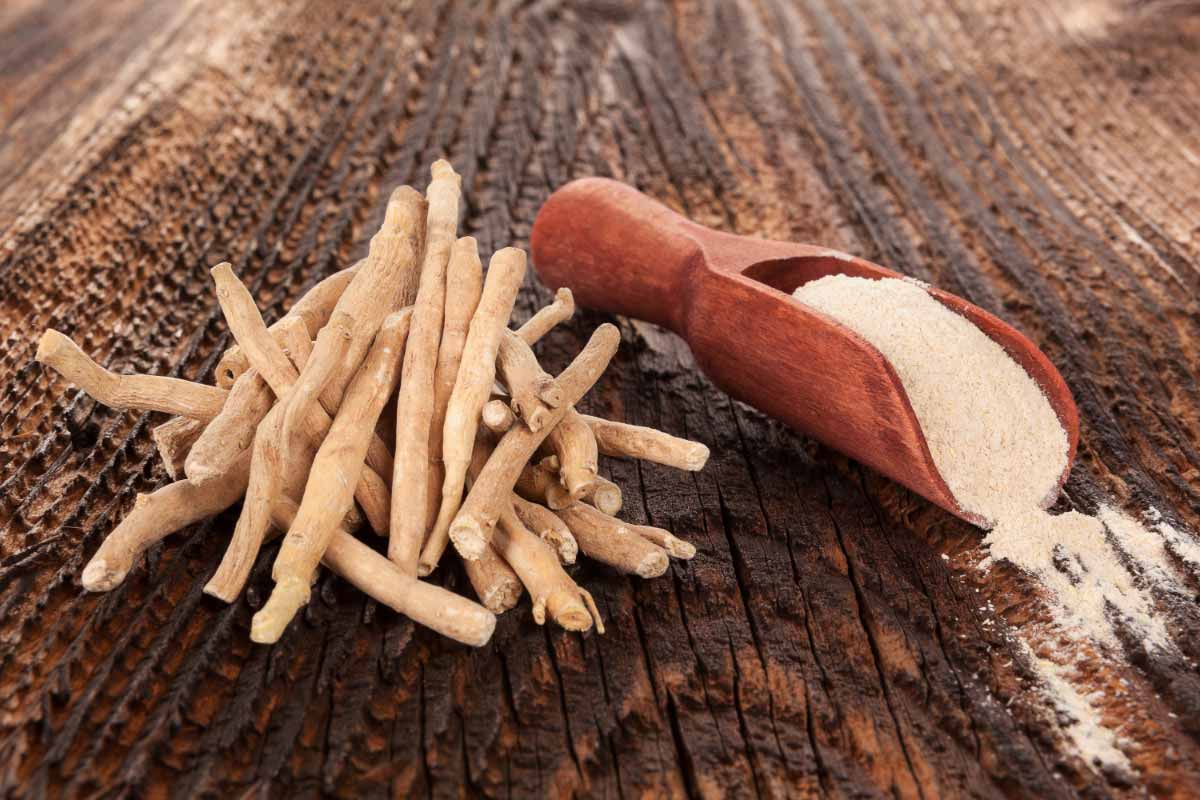Ashwagandha is an adaptogenic herb that’s popular in Ayurvedic medicine and is valued for its thyroid-modulating, neuroprotective, anti-anxiety, antidepressant and anti-inflammatory properties (1).
In India, ashwagandha is known as the “strength of the stallion” because it has traditionally been used to strengthen the immune system after an illness. Like all adaptogenic herbs, ashwagandha helps the body to maintain homeostasis, even in moments of emotional or physical stress.
Rankings
1. Essential Elements Organic Ashwagandha
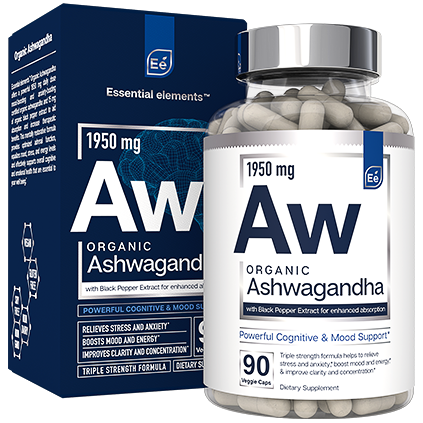
Essential elements ashwagandha includes an all organic, gluten-free, and non-GMO based formula to ensure quality. At 1950mg per serving, it’s one of the most potent organic ashwagandha supplements. Each serving also comes with 15mg of black pepper extract to further enhance absorption, helping to lower cortisol more effectively than the competition.
Third party lab tested for purity, it’s no surprise Essential elements organic ashwagandha is our #1 pick.
2. Organic Ashwagandha + by Nuzena
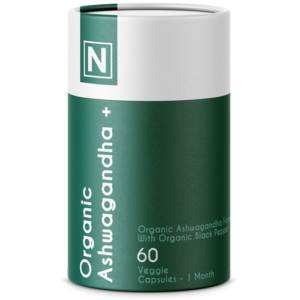
Nuzena’s organic ashwagandha shines by added black pepper extract to improve the bioavailability and effectiveness of the supplement.
All ingredients used are clinically proven as well. Nuzena also provides free shipping for orders over $50 and a free personal health specialist. Users can reach out to their personal health specialists any time before or after purchase.
3. Organic India Ashwagandha
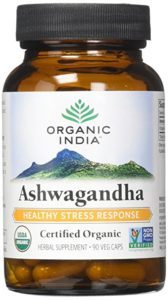
Providing 800mg of ashwagandha root extract, this particular supplement not only provides multiple benefits, but also a friendly option for numerous lifestyles. Organic India Ashwagandha is not only organic, but also vegan, gluten-free, certified kosher, and certified Halal as well.
Purchasing this ashwagandha supplement not only ensures a health altering choice but one that is steeped in a holistic, nature-minded approach.
4. NutraHerbals Ashwagandha
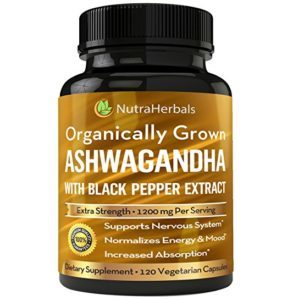
Surpassing other ashwagandha supplements per serving, NutraHerbals provides a product that not only provides the benefits for this supplement group but works to ensure better overall absorption.
As a key aspect of supplement use is bioavailability, the addition of black pepper helps your body to absorb the ashwagandha extract and ensure a more effective outcome. NutraHerbals also touts a vegan-friendly, soy-free, dairy-free, and additive-free formula. This potent and popular supplement option serves its purpose regularly.
5. Himalaya Organic Ashwagandha
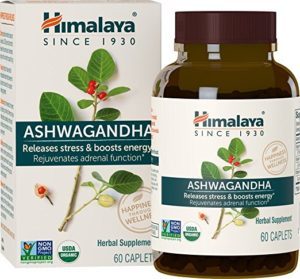
Himalaya has created an Ashwagandha supplement that contains root powder, root extract, and supercritical root extract to ensure the best quality and differentiate itself from many other Ashwagandha supplements
This clinical strength supplement provides users with the stress-relief and energy boost necessary to have success throughout the day. It is also welcoming to a myriad of unique lifestyles with its USDA certified organic, NON – GMO makeup.
6. Havasu Nutrition Ashwagandha
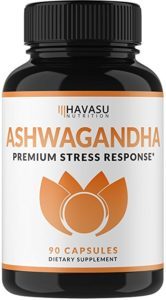
One unique quality found in Havasu’s ashwagandha supplement is the use of artichoke extract. Clinically proven to be a high antioxidant food, artichoke extract not only provides an increase in bioavailability for users, but also a boost in magnesium, phosphorus, potassium, and iron.
Proving 1000mg of ashwagandha root in capsule form, this brand’s supplement provides a lot of value for your money. As an all-organic, GMO-free option, Havasu gives users almost as much as top tier supplement options for the fraction of the cost.
7. Planetary Ayurvedic’s Ashwagandha
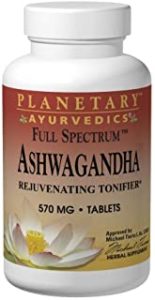
Planetary Ayurvedic’s Ashwagandha comes as a full-spectrum supplement providing 500mg of ashwagandha root and 70mg of ashwagandha root extract. One element that it has over many competitors is its tablet form.
This particular ashwagandha can also serve as a dual- purpose supplement. As it also provides 59mg of calcium, those needing a calcium supplement may also find this to be a great source while saving a little money as well.
8. NutriGold Organic Ashwagandha Gold
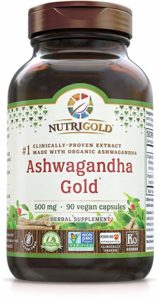
Making them distinctly different from their counterparts, the KSM-66 standardization to 5% withanolides ensures a very high rate of potency. With 300mg organic ashwagandha root extract and 200mg organic full-spectrum ashwagandha root powder.
One important thing to note – this particular supplement does contain a milk derivative. Those who have dairy allergies or sensitivities may need to look for other options to ensure they have the best possible experience.
9. Gaia Herbs Ashwagandha
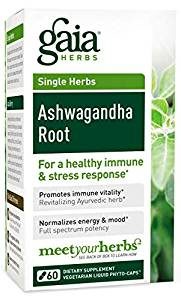
In their vegan-friendly liquid gel caps, Gaia Herbs provides 350mg of ashwagandha root daily. Though this supplement does not provide as much extract as other options, it makes up for this in potency and bioavailability.
Additionally, the Gaia Herbs supplement is made exclusively at the Gaia certified organic farm. With their commitment to excellence, Gaia manufactures its products at a company-owned farm with the absence of peanuts, meat, sesame, shellfish, yeast, eggs, soy, gluten, or dairy.
10. NutriFlair
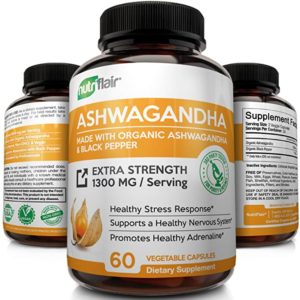
While this is a pure and certified organic brand, NutriFlair brings things one step further. Marketing themselves as cruelty-free and free of animal ingredients or by-products, there is much to be said about a company with a conscience.
With 1300mg ashwagandha root per serving, you’re sure to get the benefits of ashwagandha most expediently and efficiently. Combined with black pepper for bioavailability, NutriFlair’s formula is one to be reckoned with among possible supplement options.
11. NaturaLife Labs Organic Ashwagandha
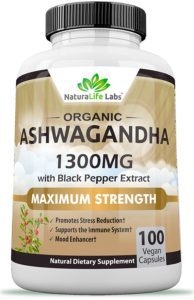
Boasting almost double the highest serving size of other ashwagandha supplements, NaturalLife has gone above and beyond with their supplement option.
Though there is no current FDA regulation among the ashwagandha supplement industry, NaturalLife is manufactured in an FDA approved facility. Consumers can rest easy knowing that their supplement is gluten-free, soy-free, dairy-free and contains no GMO ingredients.
How We Ranked
The first thing we looked at was the purity of the supplement. Many companies will use ashwagandha in a blend of herbal supplements, and we wanted pure ashwagandha supplements. Anything not pure, was eliminated.
Second, we looked into the ingredients and potency for each supplement. Research shows that twice a day, dosing is more optimal for ashwagandha. As such, we preferred companies provided 400-650mg of ashwagandha per serving so that the dose could be doubled up. One of our top picks, NutraHerbals, comes in at 600mg per capsule.
For the most part, ashwagandha comes in 4 main categories: capsules, powders, tinctures, and teas. We eliminated tea because they often did not contain the clinically effective dosage. Tinctures were also cut because they were more difficult to accurately dose – you have to eyeball the tincture and hope it’s mixed well.
This left us with powders and capsules. Both are solid options, but we did lean towards capsules, like Organic India, due to effortless dosing and their friendliness of travel. Moon Juice was an exception due to their purity and flavourless powder formula
Lastly, we looked at other ingredients in the products. Any product with more than just ashwagandha was frowned upon since we were going after pure ashwagandha products. The only exception was small doses of black pepper extract, which studies show that it may increase the absorption of ashwagandha. Our top pick, Essential Elements, shines in having the perfect ratio of black pepper extract.
Benefits
1. Ashwagandha can increase muscle and strength. A 2010 study published in the International Journal of Ayurveda Research showed that ashwagandha may increase strength and improve body composition (2).
Another 2012 study showed that healthy men who took 750–1,250 mg of ashwagandha per day gained muscle strength after 30 days (3).
Lastly, a 2015 study published in the Journal of the International Society of Sports Nutrition demonstrated that participants who supplemented with ashwagandha had significantly greater gains in muscle size and strength (4).
2. Ashwagandha can help lower cortisol. A 2012 study was designed to evaluate the safety and efficacy of a high-concentration full-spectrum extract of Ashwagandha roots in reducing stress and anxiety and in improving the general well-being of adults who were under stress (5).
64 subjects with a history of chronic stress were enrolled in the study. They were randomized to either the placebo control group or the study drug treatment group and were asked to take one capsule twice a day for a period of 60 days. In the study drug treatment group, each capsule contained 300 mg of high-concentration full-spectrum extract from the root of the Ashwagandha plant.
After 60 days the results showed that a high-concentration full-spectrum Ashwagandha root extract safely and effectively improves an individual’s resistance towards stress and thereby improves self-assessed quality of life.
Another 2009 study showed that ashwagandha supplementation improved semen quality in stress-related infertility (6).
Lastly, a study done on chronically stressed adults showed a 30% reduction in cortisol (on average) for those who supplemented with ashwagandha (7).
3. Ashwagandha has been shown to lower blood sugar levels. A 2013 study published in the Indian Journal of Pharmacology demonstrated that people with schizophrenia who were treated with ashwagandha had an average reduction in fasting blood sugar levels of 13.5 mg/dL, compared to 4.5 mg/dL in those who received a placebo (8).
Another 2015 test-tube study found that ashwagandha supplementation increased insulin secretion and improved insulin sensitivity in muscle cells (9).
4. Ashwagandha fights depression. In one controlled 60-day study in 64 stressed adults, those who took 600 mg of ashwagandha per day reported a 79% reduction in severe depression, while the placebo group reported a 10% increase (10).
However, only one of the participants in this study had a history of depression. For this reason, the relevance of the results is unclear.
5. Ashwagandha can boost testosterone. One 2013 study with infertile men as subjects who supplemented with 675mg/day of ashwagandha for 90 days showed a ~17% boost in T, with a ~36% increase in luteinizing hormone (LH), suggesting that ashwagandha stimulates testosterone production at brain level (11).
Another 2015 study showed that 600mg per day of ashwagandha (using KSM-66 extract), showed a significant ~15% increase in testosterone levels (average rise from 630 ng/dL to 726 ng/dL (12).
6. Ashwagandha fights and protects against cancer. A 2014 animal study showed that ashwagandha cause cancer cell death (apoptosis) (13).
Not only that, but another 2015 study showed that it may cause cancer cells to become less resistant to apoptosis (14).
According to the first 2014 study, ashwagandha is believed to generate reactive oxygen species (ROS), which are toxic to cancer cells but not normal cells (15).
Animal studies suggest that it may help treat several types of cancer, including breast, lung, colon, brain and ovarian cancer (16, 17, 18, 19).
In one study, mice with ovarian tumors treated with ashwagandha alone or in combination with an anti-cancer drug had a 70–80% reduction in tumor growth. The treatment also prevented the spread of cancer to other organs (20).
7. Ashwagandha helps calm you down. A 2015 study showed that ashwagandha blocked the stress pathway in the brains of rats by regulating chemical signaling in the nervous system (21).
Three controlled human studies (2000, 2009 & 2012) have demonstrated that ashwagandha supplementation can reduce stress and anxiety symptoms in people with related disorders (22, 23, 24).
A 2-month long study showed that those who supplemented with ashwagandha versus a placebo resulted in a 69% average reduction in anxiety and insomnia, compared to 11% in the placebo group (25).
In another six-week study (2000) published in the Indian Journal of Psychiatry showed that 88% of people who took ashwagandha reported a reduction in anxiety, compared to 50% of those who took a placebo (26).
8. Ashwagandha can improve memory. An eight-week study done in 2017 involving 50 adults, showed that taking 300 mg of ashwagandha root extract twice daily significantly improved general memory, task performance and attention (27).
One 2012 study published in Neurochemical Research showed that epileptic rats treated with ashwagandha had nearly a complete reversal of spatial memory impairment (28).
9. Ashwagandha can increase fertility in men. In one 2009 study, men who received ashwagandha for stress experienced higher antioxidant levels and better sperm quality. After three months of treatment, 14% of the men’s partners had become pregnant (29).
Another study involving 75 infertile men, the group treated with ashwagandha showed increased sperm count and motility (30).
10. Ashwagandha can lower triglycerides. A 2007 study done with rats found that ashwagandha supplementation lowered triglycerides by nearly 45% and total cholesterol by as much as 53% (30).
Another 60-day study done with chronically stressed adults showed that the group taking the highest dosage of ashwagandha experienced a 17% decrease in “bad” LDL cholesterol and an 11% decrease in triglycerides, on average (31).
11. Ashwagandha can help with arthritis. One 2015 study published in the Indian Journal of Medical Research found the ashwagandha herb to have strong potential as a treatment option for rheumatoid arthritis (32).
12. Ashwagandha helps treat Alzheimer’s. A meta-analysis published in the African Journal of Traditional, Complementary and Alternative Medicine, several studies have examined ashwagandha’s ability to slow or prevent loss of brain function in people with diseases like Alzheimer’s, Huntington’s, and Parkinson’s (33).
13. Ashwagandha can reduce inflammation. A 2010 study done with humans found that ashwagandha increases the activity of natural killer cells, which are immune cells that fight infection and help you stay healthy (34).
It has also been shown to decrease markers of inflammation, such as C-reactive protein (CRP). This marker is linked to an increased risk of heart disease (35).
14. Ashwagandha can increase thyroid hormone levels. While this could be a problem for those with specific diseases and conditions, others may benefit from a rise in thyroid hormone levels.
Hypothyroidism is a very common disease affecting more than 3 million people in the United States each year. When hypothyroidism occurs, the thyroid gland has become underactive which could pose multiple risks and cause multiple issues. In some cases, hypothyroidism left untreated could cause nerve injury, infertility, and even death.
The primary treatment for hypothyroidism involves taking synthetic thyroid hormone to boost levels. While this is generally successful, there have been some reports of negative side effects and varying degrees of tolerance. For those who would prefer a more natural option supplements such as ashwagandha are a great choice.
Though there are still many strides to make in the research of ashwagandha, recent studies suggest a positive correlation between ashwagandha intake and thyroid hormone levels. A study conducted in 2018 found that taking 600mg of ashwagandha root extract daily brought significant improvements in thyroid levels.
Over 8 weeks, 50 people were given the required dosage of ashwagandha root per day. Those receiving the supplements saw a 41.5% increase in their levels. This increase removes the need for standard prescriptions and provides a much more natural alternative.
Side Effects
1. Ashwagandha doesn’t have any long term proof of safety in humans. Ashwagandha is generally considered well-tolerated in small to medium doses. However, there haven’t been enough long-term studies to examine possible side effects.
2. Ashwagandha can interact negatively with autoimmune diseases. People with autoimmune diseases should also avoid ashwagandha unless authorized by a doctor. This includes people with conditions like rheumatoid arthritis, lupus, Hashimoto’s thyroiditis, and type 1 diabetes.
Additionally, those on medication for thyroid disease should be careful when taking ashwagandha, as it may potentially increase thyroid hormone levels in some people. It may also decrease blood sugar and blood pressure levels, so medication dosages may need to be adjusted if you take it.
3. Ashwagandha isn’t regulated by the FDA. Another potential concern for Ayurvedic herbs is that the manufacturers aren’t regulated by the U.S. Food and Drug Administration (FDA). This means they aren’t held to the same standards as pharmaceutical companies and food producers.
4. Ashwagandha products can be contaminated with heavy metals. One study funded by the National Center for Complementary and Integrative Health found that 21 percent of 193 products (made in both the United States and India) had levels of lead, mercury, and/or arsenic that were above what’s considered acceptable for human daily intake (36).
5. Ashwagandha root may cause an allergic reaction. While it is generally well-tolerated, ashwagandha has been known to cause allergies for customers with various degrees of immune reactivity. As with many herbs, those who have a history of allergic reactions to trees or various types of grass should be very mindful when beginning an ashwagandha regimen. In general, mild to moderate allergic reactions could result in symptoms such as rashes, hives, or mild abdominal discomfort.
In some cases, however, a more serious allergic reaction known as anaphylaxis may also occur. Anaphylaxis is triggered by an overreaction of the immune system and can cause, dizziness, rashes across the body, hives, difficulty breathing, and, in some cases, death.
Those concerned about the possibility of an allergic reaction should first consult a physician before beginning ashwagandha use. If an allergic reaction does occur, it is important to ensure you cease the use of the supplement and move forward with other options and possibilities.
Recommended Dosage
The dosage and the way ashwagandha is used depends on the condition you’re trying to treat. There isn’t a standard dosage that’s been studied by modern clinical trials.
Ashwagandha may be used in powdered form in dosages ranging from 450 milligrams to 2 grams. You can buy it in capsules, powders, or as a liquid extract from health food or supplement stores.
Ashwagandha dosages in studies typically ranged from 125–1,250 mg daily. In studies where different dosages were taken, the higher dosage usually produced the most dramatic improvements.
If you want to supplement with ashwagandha, look for root extract or powder in 450–500 mg capsules and take it once or twice per day.
FAQ
What does ashwagandha do for the body? Ashwagandha is also used as an “adaptogen” to help the body cope with daily stress, and as a general tonic. Some people also use ashwagandha for improving thinking ability, decreasing pain and swelling (inflammation), and preventing the effects of aging.
Is it safe to take ashwagandha daily? Yes, it is 100% safe to take normal levels of ashwagandha daily (300-500mg/day).
Is Ashwagandha good for testosterone? Ashwagandha will not turn you into a super virile horse-man, but some of the benefits of ashwagandha do include improving sperm quality and boosting testosterone levels.
Can you take ashwagandha at night? Yes, you can take it at any time of the day.
Can Ashwagandha cause high blood pressure? No, ashwagandha is an adaptogenic herb, and it is one of the most popular Ayurvedic herbs not just for lowering blood pressure, but also for reducing inflammation and stress.
How long does it take for ashwagandha to start working? It will take some time to begin to take effect in the body and reverse damage caused by long-term stress and high cortisol levels. Combined with sensible dieting and training, consistently supplementing with Ashwagandha will take approximately 2 weeks to take effect.
Does Ashwagandha increase estrogen? No, it is thought to lower estrogen levels while simultaneously raising progesterone, thus helping to relieve hormone imbalance and estrogen dominance symptoms.
Is Ashwagandha good for sperm and infertility? Ashwagandha is an effective herbal remedy for stress and infertility. It improves blood circulation throughout the body and enhances sperm quality naturally. Ashwagandha root extract also shows an increase in sperm concentration, ejaculate volume, and motile sperm count and an increase in the serum levels of testosterone.
Is Ashwagandha beneficial for the kidneys? A rat study indicated that ashwagandha may be a protective agent for the liver and kidney damage that can be induced by carbendazim.
How do you take ashwagandha? The recommended dose of ashwagandha root or leaf powder for both short- and long-term use is 1–2 tsp twice daily, boiled in water or mixed with milk, buttermilk, ghee, or honey. You can also have ashwagandha root or leaf extract at a dose of 600–1200 mg.
Is Ashwagandha good for hair growth? Cortisol is released as a response to stress, and stress is one of the major causes of hair loss in both men and women. Ashwagandha can control hair loss by reducing cortisol levels in the body. The antioxidants in ashwagandha effectively prevent the corrosion of tissue, reducing the possibility of premature greying. Ashwagandha is also used to stimulate the hair follicles and maintain the health of the hair.
Can Ashwagandha help individuals gain weight? There are some natural ayurvedic remedies, including ashwagandha that can help you gain weight in a healthy way. The best formula is to mix a glass of hot whole milk, add two tablespoons of ashwagandha powder and a teaspoon of clarified butter (ghee). Drink it twice a day for a month to gain weight.
Is Ashwagandha good for arthritis? If applied topically in the form of a paste made from the roots and leaves with water, it effectively reduces inflammation at the joints. For the relief of stubborn joint pain without facing other side effects, opt for ashwagandha for arthritis, a natural anti-arthritic herb.
Is Ashwagandha good for sleep? The Ayurvedic herb ashwagandha supports healthy sleep by rejuvenating the body and addressing stress-related exhaustion. Ashwagandha (Withania Somnifera) has emerged as one of the world’s most powerful adaptogens, which means it helps the adrenal system regulate hormones and helps the body cope with stress.
Can ashwagandha help to increase muscle mass? Yes, ashwagandha can be used to increase muscle mass and is ideal for those involved in bodybuilding. Though commonly associated with general weight gain as well, this holistic root affects hormones and stimulates the growth of muscle mass as opposed to traditional fat forms.
Should women take ashwagandha? While women who are pregnant or breastfeeding should not take ashwagandha, those who are healthy should consider taking this supplement for multiple reasons. There have been many clinical trials and studies indicating that women can also benefit from the use of ashwagandha despite it being marketed to a largely male base.
Can ashwagandha be taken on an empty stomach? With it being generally well – tolerated, ashwagandha can be taken on an empty stomach. In the event you experience any abdominal discomfort, it is recommended that you eat a small amount of food before use. If the abdominal discomfort or irritation continues, it is recommended that you contact your general practitioner for additional assistance.
Can ashwagandha help with weight loss? Though there have been very few studies demonstrating the effects of ashwagandha for weight loss, there are. Clinical studies and research in humans and several species of animals have shown that there is a slight correlation between the use of ashwagandha and weight loss. Though it is uncertain how this occurs, ashwagandha has been known to decrease food cravings and food consumption.
Is ashwagandha safe to take? Current data suggests that ashwagandha is safe to take and presents very few difficulties for the general public. This could vary, however, based on the person involved. With this being the case consumers should always make sure that they pay attention to any unplanned symptoms or concerns.
Can I take ashwagandha long-term? In general, consumers should plan on using ashwagandha short-term. Many of the clinical studies that have been completed are designed for short-term users. Currently, there is little to no evidence to determine the long-term effects of ashwagandha. If you have further concerns not address through the short-term use of ashwagandha, it is recommended that you seek the advice of your general or Ayurvedic practitioner.
Is ashwagandha safe for vegans and vegetarians? Ashwagandha provides a fantastic supplement option for those who consider themselves vegan or vegetarian. As a plant extract, ashwagandha supplements should only contain plant material. High- quality supplements will always adhere to better ingredients to maintain the integrity of their product. It is highly recommended, however, that you check ingredients before purchase if this is an area of concern. Low-quality manufacturers may choose to use fillers or binders in their products
What are adaptogens? An adaptogen is a substance used in herbal medicine. In general, they are used to enhance the stabilization of the physiological processes and promotion of homeostasis.
Is ashwagandha good to take before a workout? Yes, ashwagandha is safe to take before a workout. Though it is known to assist in weight loss and muscle gain, there have been few studies to support ashwagandha’s exact metabolic role during or after a workout.
What does ashwagandha root smell like? For those who choose to purchase the powder form of ashwagandha, there is a distinct and powerful aroma. It is often described as “horse-like”. With this in mind, those who may be more sensitive to smells or have an aversion to bitter scents may find capsule forms to be a better match.
What does ashwagandha taste like? Similar to its very distinctive smell, ashwagandha also has a very definitive taste as well. The powder has been known to be extremely bitter. Though it is recommended to consume the powder with warm milk, honey, and butter, some may still experience difficulty with the taste. If you find that the powder is not as palatable as you would like, you may want to explore ashwagandha capsules as an alternative.
Recap
Ashwagandha is a well-researched herb that serves many purposes and benefits many systems in the human body including but not limited to, the neurological, immune, reproductive and endocrine systems. The most popular form of ashwagandha is the root extract, known as KSM-66, but leaf extracts are also available.
These extracts can be found in capsule and powder forms. When supplementing with ashwagandha, it’s recommended to start with 300 to 500 milligrams per day.
For Healthtrends #1 ashwagandha recommendation, click here.
